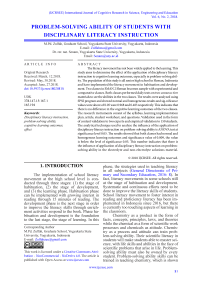Problem-solving ability of students with disciplinary literacy instruction
Автор: M.Pd. Zulfah, Dr. rer. nat. Senam
Журнал: International Journal of Cognitive Research in Science, Engineering and Education @ijcrsee
Рубрика: Original research
Статья в выпуске: 2 vol.6, 2018 года.
Бесплатный доступ
The literacy movement has not been widely applied to the learning. This study aims to determine the effect of the application of disciplinary literacy instruction to cognitive learning outcomes, especially in problem-solving ability. The population of this study is all senior high school in Sleman, Indonesia and have implemented the literacy movement in habituation and development. Two classes in SMAN 2 Sleman becomes sample with experimental and comparative classes. Both classes performed daily tests on two consecutive materials to see the abilities in the two classes. The results were analyzed using SPSS program and showed normal and homogeneous results and significance values were above of 0.05 were 0.968 and 0.483 respectively. This indicates that there is no difference in the cognitive learning outcomes of the two classes. The research instruments consist of the syllabus, learning implementation plan, article, student worksheet, and questions. Validation used in the form of content validation to two experts and empirical validation to 150 students. The analytical technique used to analyze the influence of the application of disciplinary literacy instruction on problem-solving ability is ANOVA test at significance level 0.05. The results showed that both classes had normal and homogenous learning outcomes and significance value of 0.009, the value is below the level of significance 0.05. This number indicates that there is the influence of application of disciplinary literacy instruction on problem-solving ability in the electrolyte and non-electrolyte solutions material.
Disciplinary literacy instruction, problem-solving ability, cognitive learning outcomes, effect
Короткий адрес: https://sciup.org/170198528
IDR: 170198528 | УДК: 378.147.15:167.1 | DOI: 10.5937/ijcrsee1802081S


